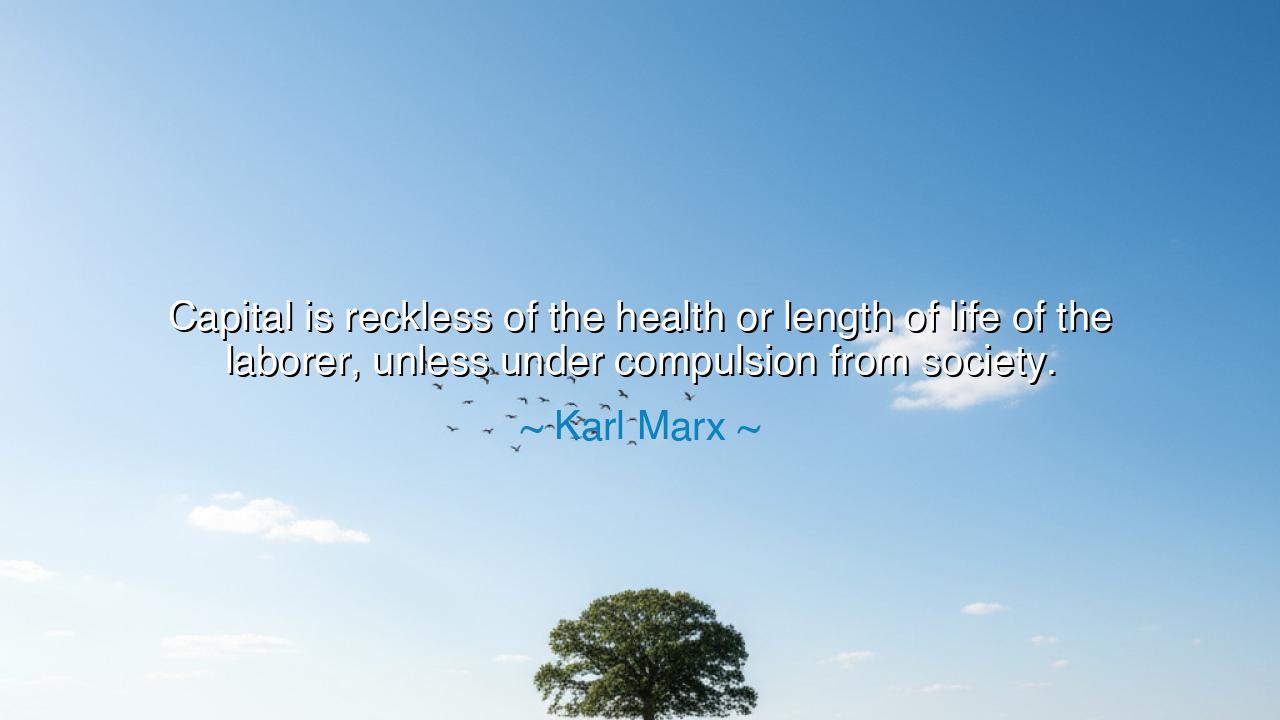
Capital is reckless of the health or length of life of the
Capital is reckless of the health or length of life of the laborer, unless under compulsion from society.






The words of Karl Marx, “Capital is reckless of the health or length of life of the laborer, unless under compulsion from society,” thunder like a warning from the forge of history. They are not spoken in hatred, but in truth—a truth born of centuries of human toil and suffering. In these words lies the cry of the worker whose hands built empires but whose body was broken in silence. Marx, with the clarity of a prophet, saw that when wealth is pursued without conscience, when profit is exalted above human life, the soul of society begins to decay.
The meaning of this quote reaches far beyond the factories of the 19th century. It reveals a law as old as civilization itself: when the few hoard the fruits of labor, the many bear the wounds of that greed. Capital, as Marx used it, was not mere money, but the power that commands labor, extracts life from it, and discards it when spent. Left unchecked by moral restraint or social law, this force grows indifferent to suffering. It consumes men and women as raw material—until society, awakened by outrage, rises to compel justice.
Marx spoke these words in the age of industrial revolution, when cities were blackened by smoke and the poor toiled sixteen hours a day in the roar of machines. Children crawled beneath gears; women worked until their lungs gave out. Wages were meager, rest was a luxury, and safety was scorned in the name of profit. It was only when society—through unions, reformers, and revolution—demanded change that the machine of greed was forced to yield. Laws were passed. Hours were shortened. Health was defended. But not by the will of the owners—only by the compulsion of conscience made collective.
History offers many such awakenings. Think of Frances Perkins, the woman who stood at the scene of the Triangle Shirtwaist Factory Fire in 1911, where 146 garment workers—mostly young immigrant women—burned or leapt to their deaths because the factory doors were locked. That day, she saw Marx’s truth in flames: capital was reckless of the health or life of the laborer. But from that horror, she rose to become the first woman in a U.S. Cabinet, guiding laws that birthed labor protections, unemployment insurance, and the forty-hour workweek. Her life became a living answer to Marx’s lament: that only the awakening of society could compel industry to remember its humanity.
The origin of Marx’s thought is rooted in moral philosophy as much as economics. He believed that work is sacred—that the laborer gives life meaning through creation. Yet when capital seizes that creation for profit alone, it estranges the worker from his own spirit. The hammer that builds also breaks; the loom that weaves also binds. Without justice, production becomes enslavement. Marx’s words remind us that the true measure of progress is not the wealth of the few, but the well-being of all.
But this is not merely a story of the past. Even today, in the towers of technology and the fields of global industry, the same truth endures. When profit blinds the eyes of enterprise, when corporations drain the earth and the worker alike, the same sickness returns. The struggle of the laborer for dignity, fair wages, and safe conditions is not an ancient war—it is the eternal defense of the human spirit against the cold logic of greed.
The lesson is clear: every society must be the guardian of its workers. Where power grows, so too must accountability. The health of the laborer is the heart of civilization, and no progress can stand upon broken backs. Let every citizen, employer, and leader remember that wealth is a servant, not a master, and that to protect the laborer is to preserve the nation’s soul.
So let this truth be passed down to future generations: when profit forgets mercy, it must be restrained by justice. A moral society does not let its people toil in misery; it lifts them, protects them, and honors their work as sacred. For only when labor and life are cherished together does humanity truly advance—and the flame of civilization burns with both strength and compassion.






AAdministratorAdministrator
Welcome, honored guests. Please leave a comment, we will respond soon